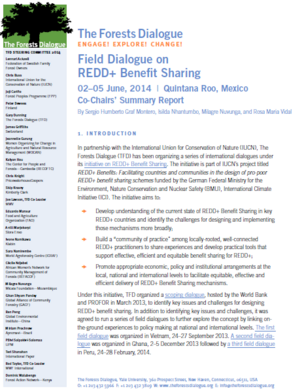Co-Chairs’ Summary: REDD+ Benefit Sharing Field Dialogue in Mexico
In partnership with the International Union for Conservation of Nature (IUCN), The Forests Dialogue (TFD) organized a series of international dialogues under its initiative on REDD+ Benefit Sharing. The initiative is part of IUCN’s project entitled REDD+ Benefits: Facilitating countries and communities in the design of pro-poor REDD+ benefit sharing schemes, funded by the German Federal Ministry for the Environment, Nature Conservation and Nuclear Safety (BMU), International Climate Initiative (ICI). The initiative aimed to:
- Develop understanding of the current state of REDD+ Benefit Sharing in key REDD+ countries and identify the challenges for designing and implementing those mechanisms more broadly;
- Build a “community of practice” among locally-rooted, well-connected REDD+ practitioners to share experiences and develop practical tools that support effective, efficient and equitable benefit sharing for REDD+;
- Promote appropriate economic, policy and institutional arrangements at the local, national and international levels to facilitate equitable, effective and efficient delivery of REDD+ Benefit Sharing mechanisms.
Under this initiative, TFD organized a scoping dialogue, hosted by the World Bank in March 2013, to identify key issues and challenges for designing REDD+ benefit sharing mechanisms. As well as key issues and challenges being identified it was also agreed to run a series of field dialogues to further explore the concept. A final field dialogue was organized in Chetumal, Mexico between 2–5 June 2014. The dialogue engaged 24 international participants from 13 countries and 33 national experts and it was co-hosted by CONAFOR and CONABIO.
During the first 2 days of the dialogue, participants had the opportunity to discuss with local stakeholders lessons learnt from the integrated conservation and development approach in Yucatan Peninsula, Mexico. This integrated approach also lies at the heart of Mexico’s REDD+ Strategy: integration of public land use policies, beyond forest land, that promotes integrated and sustainable rural development while strengthening community management of forest and conservation of its biodiversity. This report summarizes key observations and discussions from the dialogue.

